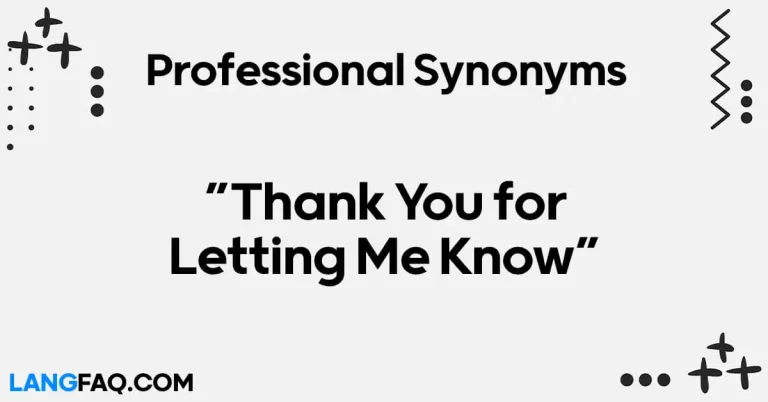Embarking on a culinary journey with friends often leads to the age-old dilemma of splitting the bill. In this guide, we’ll delve into the art of suggesting each person pays for their own meal without causing any awkwardness. Let’s uncover 12 other ways to gracefully communicate this dining etiquette.
12 Other Ways to Say “Pay for Your Own Meal”
Here are 12 alternative ways to express “Pay for Your Own Meal”:
- Cover Your Own Costs
- Handle Your Own Bill
- Take Care of Your Own Tab
- Settle Your Portion
- Manage Your Own Expenses
- Foot Your Own Food Bill
- Each Person Pays Their Way
- Cover Your Culinary Expenses
- Be Responsible for Your Meal
- Handle Your Own Dining Charges
- Take Charge of Your Own Tab
- Pay Individually for Your Meal
Here’s a table with meanings and examples for the alternative ways to express “Pay for Your Own Meal”:
| Expression | Meaning | Example |
|---|---|---|
| Cover Your Own Costs | Take responsibility for your expenses. | “Let’s all cover our own costs tonight.” |
| Handle Your Own Bill | Manage and pay for your individual bill. | “It’s easier if we each handle our own bill.” |
| Take Care of Your Own Tab | Be responsible for settling your own tab. | “Could you please take care of your own tab?” |
| Settle Your Portion | Pay for the specific part of the bill you owe. | “Let’s settle our portions before leaving the restaurant.” |
| Manage Your Own Expenses | Handle and cover your personal food costs. | “Everyone, manage your own expenses for this meal.” |
| Foot Your Own Food Bill | Personally pay for your meal charges. | “We’re each going to foot our own food bills tonight.” |
| Each Person Pays Their Way | Individuals cover their own dining expenses. | “In this group, each person pays their own way.” |
| Cover Your Culinary Expenses | Take charge of your individual food costs. | “We’ll dine out, and everyone covers their culinary expenses.” |
| Be Responsible for Your Meal | Assume responsibility for your own meal cost. | “Let’s be responsible for our meals tonight.” |
| Handle Your Own Dining Charges | Manage and pay for your personal dining expenses. | “It’s simpler if we all handle our own dining charges.” |
| Take Charge of Your Own Tab | Assume control of settling your own tab. | “Feel free to take charge of your own tab at the restaurant.” |
| Pay Individually for Your Meal | Pay separately for your individual meal. | “It’s more convenient if we all pay individually for our meals.” |
This diverse array of expressions provides a nuanced approach to convey the idea of “Pay for Your Own Meal.” Whether you opt for the straightforward “Handle Your Own Bill” or the more creatively phrased “Foot Your Own Food Bill,” these alternatives offer flexibility in communicating the expectation of individual financial responsibility during shared meals. Choose the expression that aligns with the tone of your gathering, ensuring a smooth and courteous experience for all involved.
Is It Correct to Say “Pay for Your Own Meal”?
Certainly! The phrase “Pay for Your Own Meal” is grammatically correct and widely used in everyday language. It conveys a straightforward and clear message, indicating that each person is responsible for covering the cost of their individual meal when dining out.
Usage: This expression is suitable for various contexts, both formal and informal. It’s commonly used among friends, colleagues, or acquaintances when deciding how to handle the bill at a restaurant. It’s a polite and direct way to communicate the expectation of individual financial responsibility.
Examples:
- Informal Setting among Friends:
- Friend 1: “Let’s grab dinner tonight.”
- Friend 2: “Sure, but how should we split the bill?”
- Friend 1: “No worries, we can just pay for our own meals. Easy and fair!”
- Formal Setting among Colleagues:
- Colleague 1: “For our business dinner, how should we handle the expenses?”
- Colleague 2: “I suggest we each pay for our own meals. Keeps things simple and transparent.”
Variations: While “Pay for Your Own Meal” is direct and widely understood, you can also use alternative phrases like “Cover Your Own Costs,” “Handle Your Own Bill,” or “Take Care of Your Own Tab” for added variety or formality, depending on the context.
Professional Mail Example With “Pay for Your Own Meal”
Subject: Upcoming Team Lunch Arrangements
Dear [Recipient’s Name],
I trust this email finds you well. As we plan for our upcoming team lunch, I wanted to address the logistics regarding the bill settlement to ensure a seamless and enjoyable dining experience for everyone.
Considering the diverse preferences and dietary requirements within our team, I propose that we adopt a straightforward approach for the bill. Each team member will pay for their own meal. This method not only simplifies the process but also allows for individual autonomy and ensures fairness.
The restaurant we’ve chosen offers a variety of options to accommodate different tastes. By covering our own expenses, we can enjoy the meal without the need for complex calculations or potential discrepancies.
If this arrangement aligns with everyone’s preferences, kindly acknowledge your agreement or provide any alternative suggestions you may have. Your input is valued, and we aim to make this team lunch an enjoyable and inclusive experience for all.
Looking forward to a delightful meal together.
Best regards,
[Your Full Name] [Your Position] [Your Contact Information]
Cover Your Own Costs
In the realm of dining etiquette, the expression “Cover Your Own Costs” encapsulates the idea of individual financial responsibility. This phrase is suitable for formal and informal contexts, emphasizing a shared but autonomous approach to expenses.
Scenario: Imagine a business lunch where colleagues want to maintain professionalism while ensuring fairness. Using “Cover Your Own Costs” subtly conveys that everyone is responsible for their portion without explicitly discussing finances.
Example: Colleague 1: “How about we make this a business lunch? Everyone can cover their own costs to keep things straightforward and professional.”
Email Sample:
Subject: Business Lunch Proposal
Dear Team,
I propose that for our upcoming business lunch, we each cover our own costs. This ensures transparency and professionalism during the meal. Looking forward to a productive discussion.
Best regards, [Your Name]
Variations:
- Cover Your Personal Expenses: Ideal for a formal setting.
- Each Person Bears Their Own Costs: Suitable for emphasizing individual responsibility among colleagues.
Handle Your Own Bill
When navigating the intricacies of splitting restaurant bills, the phrase “Handle Your Own Bill” is a clear and direct way to communicate that each individual manages their expenses independently. It’s versatile and can be used in various social settings.
Scenario: Picture a casual dinner with friends where simplicity and clarity are key. Suggesting to “Handle Your Own Bill” ensures a smooth end to the meal without any confusion.
Example: Friend 1: “Let’s grab dinner tonight. How about we all handle our own bills this time?”
Email Sample:
Subject: Dinner Plans
Hey everyone,
Excited for dinner tonight! Let’s keep it simple and handle our own bills. Looking forward to a great evening together.
Cheers, [Your Name]
Variations:
- Take Care of Your Own Expenses: Adds a touch of responsibility.
- Manage Your Personal Bill: Suitable for a more formal context.
Take Care of Your Own Tab
“Take Care of Your Own Tab” is a phrase that effortlessly combines formality with a sense of personal responsibility. It’s ideal for situations where a level of professionalism is desired, such as business dinners or formal gatherings.
Scenario: Imagine a networking event where colleagues or professionals gather. Suggesting to “Take Care of Your Own Tab” maintains decorum while ensuring financial fairness.
Example: Colleague 1: “For our networking dinner next week, let’s agree to take care of our own tabs to keep things uncomplicated.”
Email Sample:
Subject: Networking Dinner Arrangements
Dear Team,
As we prepare for our networking dinner, I propose that each of us takes care of our own tabs. This ensures a smooth and professional dining experience.
Warm regards, [Your Name]
Variations:
- Settle Your Individual Tab: A slightly more formal variation.
- Handle Your Own Dining Expenses: Suitable for a business context.
Settle Your Portion
In social gatherings where bill-splitting might cause confusion, the phrase “Settle Your Portion” gracefully communicates the expectation for each individual to pay for their specific part of the bill.
Scenario: Imagine a birthday celebration at a restaurant. Proposing to “Settle Your Portion” avoids the complexities of splitting the entire bill equally.
Example: Friend 1: “Let’s celebrate Sarah’s birthday at the Italian place. We can settle our portions to make it fair for everyone.”
Email Sample:
Subject: Birthday Celebration Plans
Hi everyone,
Excited to celebrate Sarah’s birthday! Let’s make it easy and settle our portions for the dinner bill. Can’t wait for a great evening.
Cheers, [Your Name]
Variations:
- Pay for Your Specific Items: A more detailed approach.
- Cover Your Portion of the Bill: Emphasizes individual responsibility.
Manage Your Own Expenses
“Manage Your Own Expenses” is a versatile phrase suitable for both formal and informal situations. It emphasizes autonomy and personal responsibility, making it ideal for various social settings.
Scenario: Consider a family reunion where relatives gather for a meal. Suggesting to “Manage Your Own Expenses” sets clear expectations without unnecessary complexity.
Example: Family Member 1: “Let’s keep it simple for the reunion dinner. Everyone can manage their own expenses, so it’s fair for all.”
Email Sample:
Subject: Family Reunion Dinner Plans
Dear Family,
Looking forward to our reunion dinner! Let’s keep things straightforward and manage our own expenses. Can’t wait to catch up with everyone.
Warm regards, [Your Name]
Variations:
- Handle Your Personal Costs: Adds a personal touch.
- Each Individual Manages Their Expenses: Suitable for a more formal tone.
Foot Your Own Food Bill
“Foot Your Own Food Bill” adds a touch of playfulness to the concept of individual responsibility. This phrase is well-suited for casual settings where friends or acquaintances want to maintain a light-hearted atmosphere.
Scenario: Imagine a group of friends planning a spontaneous dinner outing. Suggesting to “Foot Your Own Food Bill” injects a bit of humor into the decision-making process.
Example: Friend 1: “How about we grab pizza tonight? Let’s all foot our own food bills and keep it easy.”
Email Sample:
Subject: Dinner Plans Tonight
Hey team,
Pizza night? Sounds great! Let’s keep it light and foot our own food bills. Looking forward to some good times.
Cheers, [Your Name]
Variations:
- Cover Your Own Dinner Costs: A slightly more formal twist.
- Pay Individually for Your Food: Emphasizes individual payments.
Each Person Pays Their Way
In situations where equality and fairness are paramount, the phrase “Each Person Pays Their Way” conveys a sense of independence and financial responsibility. It’s suitable for both formal and informal occasions.
Scenario: Consider a group of friends planning a weekend getaway. Suggesting that “Each Person Pays Their Way” ensures everyone contributes fairly.
Example: Friend 1: “For our weekend trip, let’s agree that each person pays their way. It keeps things fair for everyone.”
Email Sample:
Subject: Weekend Getaway Contribution
Hi all,
Excited for our upcoming trip! Let’s ensure fairness by agreeing that each person pays their way. Looking forward to a fantastic time together.
Cheers, [Your Name]
Variations:
- Individual Contributions Only: Emphasizes the individual aspect.
- Everyone Contributes Independently: A formal variation for professional settings.
Cover Your Culinary Expenses
For a more refined and formal approach to expressing individual financial responsibility, “Cover Your Culinary Expenses” is an ideal choice. This phrase is suitable for business dinners, formal events, or any setting where professionalism is key.
Scenario: Imagine a corporate dinner with clients. Suggesting to “Cover Your Culinary Expenses” ensures a sophisticated and polished approach.
Example: Colleague 1: “As we host clients for dinner, let’s make it clear that everyone covers their culinary expenses to maintain a professional atmosphere.”
Email Sample:
Subject: Client Dinner Arrangements
Dear Team,
As we prepare for the upcoming client dinner, I suggest that each of us covers our culinary expenses. This ensures a polished and professional dining experience for our guests.
Best regards, [Your Name]
Variations:
- Manage Your Own Dining Costs: Adds a personal touch.
- Handle Your Culinary Expenses Individually: A more detailed expression.
Be Responsible for Your Meal
“Be Responsible for Your Meal” places emphasis on individual accountability and self-sufficiency. It’s suitable for scenarios where a more direct and serious tone is required, such as in formal or business settings.
Scenario: Consider a team-building dinner for colleagues. Suggesting that everyone “Be Responsible for Your Meal” sets a tone of professionalism and autonomy.
Example: Colleague 1: “For our team-building dinner, let’s all be responsible for our meals. It ensures a smooth and efficient dining experience.”
Email Sample:
Subject: Team-Building Dinner Guidelines
Dear Team,
As we plan our team-building dinner, let’s collectively be responsible for our meals. This promotes efficiency and ensures a seamless dining experience.
Warm regards, [Your Name]
Variations:
- Take Charge of Your Own Meal: A more assertive variation.
- Handle Your Personal Dining Costs: Suitable for formal communication.
Handle Your Own Dining Charges
In situations where precision and clarity are crucial, “Handle Your Own Dining Charges” provides a direct and unambiguous way to express individual financial responsibility. It’s suitable for various contexts, from casual outings to formal events.
Scenario: Imagine a group of friends organizing a farewell dinner. Suggesting to “Handle Your Own Dining Charges” avoids any potential confusion.
Example: Friend 1: “For Sarah’s farewell dinner, let’s handle our own dining charges. It’ll make the evening seamless and enjoyable.”
Email Sample:
Subject: Farewell Dinner Details
Hi everyone,
Excited for Sarah’s farewell dinner! Let’s keep it smooth by handling our own dining charges. Looking forward to a memorable evening.
Cheers, [Your Name]
Variations:
- Settle Your Personal Dining Bill: A more detailed expression.
- Manage Your Own Meal Expenses: Adds a personal touch.
Settle Your Individual Tab
“Settle Your Individual Tab” is a concise and precise way to communicate that each person is responsible for their own expenses. It’s suitable for a variety of settings, from casual dinners with friends to more formal occasions.
Scenario: Picture a gathering of friends at a pub. Suggesting to “Settle Your Individual Tab” simplifies the bill-paying process.
Example: Friend 1: “Let’s hit the pub tonight. How about we settle our individual tabs to make things easy?”
Email Sample:
Subject: Pub Night Plans
Hey everyone,
Pub night tonight! Let’s keep it simple and settle our individual tabs. Looking forward to a fun evening.
Cheers, [Your Name]
Variations:
- Pay for Your Personal Items: A more detailed expression.
- Handle Your Own Tab Payment: Suitable for a more formal context.
Manage Your Own Expenses
When it comes to expressing individual responsibility in a friendly and approachable manner, “Manage Your Own Expenses” is a versatile and widely applicable phrase. It’s suitable for various social settings, promoting autonomy and fairness.
Scenario: Imagine a group of colleagues planning a lunch outing. Suggesting to “Manage Your Own Expenses” keeps things clear and simple.
Example: Colleague 1: “Let’s have a team lunch tomorrow. How about we all manage our own expenses to make it hassle-free?”
Email Sample:
Subject: Team Lunch Tomorrow
Dear Team,
Excited for our team lunch tomorrow! Let’s keep it hassle-free by each managing our own expenses. Looking forward to a delightful meal together.
Warm regards, [Your Name]
Variations:
- Take Charge of Your Personal Costs: Adds a personal touch.
- Handle Your Own Lunch Expenses: Suitable for a more formal tone.
FAQs
1. Is it appropriate to suggest going Dutch on a first date?
Absolutely! Suggesting to go Dutch on a first date is a modern and considerate approach, promoting equality and avoiding any potential discomfort.
2. How do you propose separate checks without sounding rude?
Politely request separate checks by saying, “Could we please have separate checks? It’ll make settling the bill much more straightforward.”
3. Is it common to split bills in a business setting?
Yes, suggesting to split bills in a business setting is entirely appropriate. It allows everyone to manage their expenses independently.
4. What’s a creative way to suggest individual payments?
You can playfully suggest a “Self-Pay Style” dinner, adding a unique and engaging touch to the bill-paying process.
5. How do you handle splitting bills when dining with a large group?
To simplify the process, consider suggesting “Personal Bill Policy” or “Everyone on Their Own Tab” to ensure a fair distribution of expenses.
6. Is it acceptable to split bills at a formal dinner party?
While it’s not traditional, it’s becoming more acceptable to discuss splitting bills at formal dinner parties, promoting transparency and fairness.
Conclusion:
Mastering the art of suggesting everyone pays for their own meal involves a delicate balance of communication and tact. By exploring these 12 diverse ways, you’ll navigate the realm of bill-splitting with finesse. Remember, fostering open communication ensures everyone leaves the table with satisfied stomachs and content wallets.







